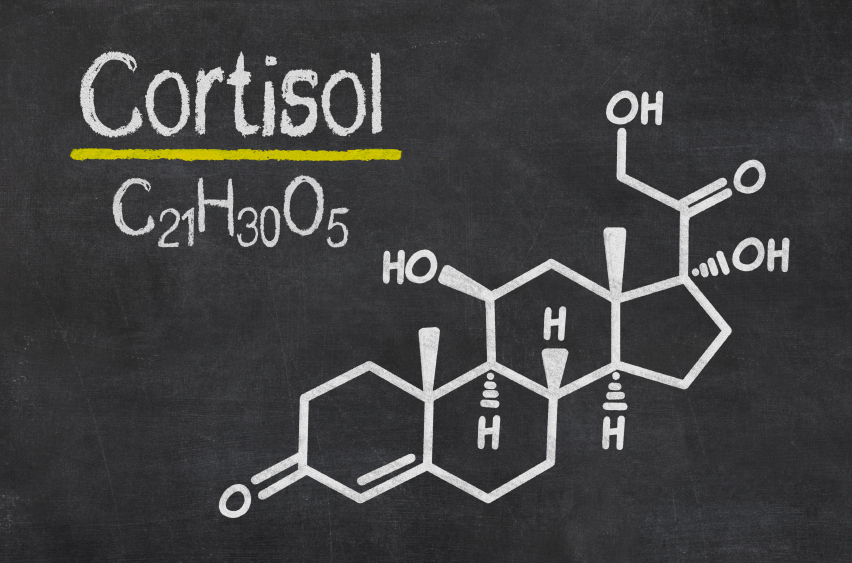
Stress can destroy you. Having chronically high cortisol levels will suppress your immune system, break down skeletal muscle, stop body fat loss and destroy your hormonal profile. My cortisol has been chronically elevated from the months of abuse I put it through during contest prep, so now it has become my goal to control it. If I can control my cortisol levels, I may be able to increase the other hormones that are currently suppressed (thyroid, testosterone, human growth hormone).
There are two variables that can improve cortisol levels: sleep and proper nutrition. I have absolute control over these. Nutrient timing of carbohydrates can significantly impact exercise performance, recovery, training adaptation and hormonal profiles.
What is Cortisol?
Cortisol is a glucocorticoid, a steroid hormone released so that the brain has glucose to use for fuel. The adrenal glands control cortisol production and the release of catecholamines, which aid in stimulating lipolysis and glycogen breakdown.
The results of high cortisol levels are:
- Suppressed TSH (T4 wont convert to T3)
- Increased blood glucose levels
- Suppressed pituitary gland, leading to low luteinizing hormone and lower testosterone levels
- Decreased liver detoxification (blood work will show increased liver enzymes)
- Gut inflammation
- Decreased immune system function
- Insomnia
Carbs for Breakfast
Breakfast may still be the most important meal of the day if you suffer from chronically high cortisol levels. Choosing to consume carbohydrates at breakfast immediately lowers cortisol, which will be highest in the morning.
RECENT: Recovering from the Stressors of Contest Prep — Hormone Replacement Therapy
Although sleep is restorative, the body still derives energy from blood glucose, liver glycogen and free fatty acids during sleep to perform physiological and metabolic functions. By the morning, liver glycogen stores and blood glucose levels are low, which results in low insulin in the blood. Because cortisol and insulin are antagonist hormones, cortisol is released to break down muscle protein. The muscle protein breaks down into amino acids, which are transported to the liver and converted into glucose via gluconeogenesis. This is the body’s attempt at maintaining homeostasis. Eating carbohydrates at breakfast will reduce the body’s need for gluconeogenesis, meaning consuming carbs will reduce blood cortisol levels.
Train in the Morning
Intense exercise can dramatically elevate cortisol levels, and the harder you train, the more stress you place on the adrenal glands. This is why I believe it's important to train in the morning if you are having issues with elevated cortisol levels. As the day progresses, cortisol levels slowly drop down, which helps aid in relaxation and results in more restorative sleep. It is important to not create a spike too late in the day, as this will prevent your cortisol levels from dropping naturally as the day progresses.
Intra-Workout Nutrition
In my opinion, implementing an intra-workout drink containing carbs and essential amino acids is critical for controlling cortisol release. As I've mentioned earlier, cortisol and insulin are antagonist hormones. Carbohydrates and essential amino acids or protein combined work synergistically to create the largest insulin release. As a result, cortisol secretion will be reduced.
Post-Workout Nutrition
Protein will increase post-resistance exercise protein synthesis and insulin secretion. Carbohydrates will generate an anti-catabolic insulin response. The combination of protein and carbohydrates works synergistically to stimulate the greatest insulin release. Consuming a high protein and carbohydrate meal post-training will lead to the greatest insulin release. As a result, you will have decreased blood cortisol levels.
My Theory
Manipulating cortisol is tricky. You need to be able to train hard to continue improving in the gym but limit the amount of stress that is being inflicted on your body. This is why intense training needs to have a matching nutrition and supplementation regime.
Two months ago, I had my blood drawn. This revealed very high cortisol levels. Since then, I've been implementing the strategies covered in this column to try and reduce my cortisol to a healthier range.
Since implementing these strategies, I've observed the following:
- Decreased anxiety
- Decreased weight gain
- Reduced hunger and increased satiety
- Increased muscular strength
- Increased body temperature (a positive sign of increased thyroid function)
- Improved sleep quality
- Decreased fatigue
- Increased libido
- Decreased cravings
In two weeks, I will get my blood drawn once again. This will have allowed 10 weeks for the nutritional strategies mentioned above to have a positive impact on my hormonal profile. I believe the blood work will prove my theory that proper timing of carbohydrates and training can positively impact blood cortisol levels. Check back next month for Part 2 and my results!












4 Comments